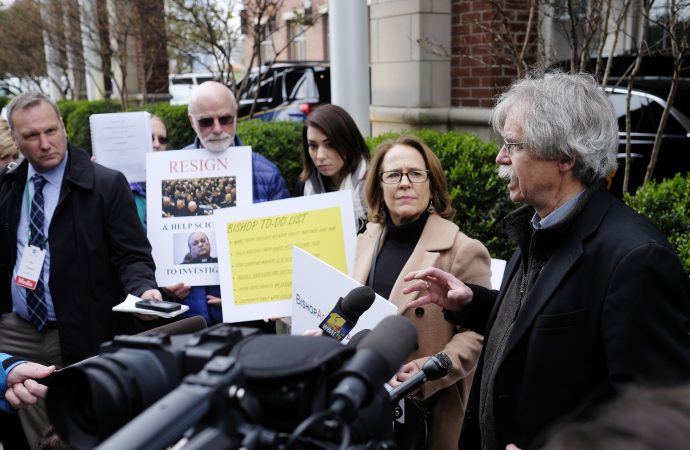
By Christopher White, The Tablet’s National Correspondent
BALTIMORE – Following Monday’s shock announcement that the Vatican has requested the U.S. Catholic Bishops to delay voting on new standards for bishop accountability, survivors of sexual abuse and bishop accountability activists decried the move as a “totally unacceptable.”
Terence McKiernan, co-director of BishopAccountability.org, called the move a “preemptive strike” by the Vatican against U.S. bishops as they seek to respond to the current crisis of sexual abuse and its cover-up “in a modest way.”
Peter Isley, a survivor of clerical sexual abuse who now works with the organization Ending Clergy Abuse, said the decision from the Vatican effectively means, “We care more about our organization and our princely titles and positions” than enacting measures of accountability.
The United States Conference of Catholic Bishops (USCCB) is gathered in Baltimore this week for its General Assembly, in which they were expected to enact new standards of conduct and accountability for bishops engaged in sexual abuse or its cover-up. At the start on Monday’s meeting, however, USCCB president, Cardinal Daniel DiNardo of Galveston-Houston, announced that he had received a request on Sunday afternoon to postpone the vote until after a global summit on the crisis at the Vatican in February.
According to CardinalDiNardo, the request came from Canadian Cardinal Marc Ouellet, prefect of the Vatican’s Congregation for Bishops.
At a press conference outside of the Marriot hotel overlooking Baltimore Harbor, where some 300 bishops representing the nation’s 195 Catholic dioceses were meeting inside, McKiernan was joined by co-director Anne Barrett Doyle who said, “when the Vatican intervenes, it’s a signal that progress will be less than we hoped.”
McKiernan and Doyle both recalled the 2002 USCCB meeting where the bishops enacted a “zero tolerance” policy against priests found guilty of abuse. At the time, the U.S. bishops had to appeal to Rome to amend canon law in the United States to accommodate the new policy – a move at the time that some within the Vatican opposed.
“The Vatican was very unhappy with ‘one strike you’re out,’ Doyle recalled. “They feared there would be, yet again, dramatic change.”
“On one hand it’s disappointing that Vatican officials continue to feel no urgency about this crisis,” David Clohessy, the ex-national director of Survivors Network of those Abused by Priests (SNAP), told The Tablet.
“On the other hand, new policies that bishops are proposing are largely meaningless,” he continued. “Overall the Vatican should be encouraging local bishops just step up more rather than discouraging bishops who want to take some steps, however minimal, toward reform.”
In the immediate aftermath of Monday’s revelations, Cardinal Blase Cupich of Chicago proposed that the U.S. bishops continue to discuss the new protocols and take a non-binding vote in order to give Cardinal DiNardo a sense of where the conference stood ahead of the February Vatican meeting, where he will represent the U.S. bishops in Rome.
At a press conference on Monday, Cardinal DiNardo – who sought to express adequate frustration over the Vatican decision, while at the same time seeking to show deference to the global Church – seemed to support Cardinal Cupich’s suggestion.
Accountability groups and survivors also indicated support of Cardinal Cupich’s proposal.
“It’s an ingenious way of circumventing this intrusion by Rome into the meeting of the conference,” said McKiernan. “It’s an attempt to proceed with what they’d hope to do here without crossing the Vatican in a way that the Vatican might feel unacceptable.”
McKiernan, however, warned that U.S. bishops are increasingly polarized over the direction of the conference and expressed some wariness as to whether not the idea might gain conference-wide support.
“I wonder if the conference is going to follow Cardinal Cupich down that road, but I really hope they do,” he said.
Meanwhile, McKiernan and Doyle were adamant that the bishops find tangible ways to show forward motion on accountability.
“They still could do something dramatic,” said Doyle. “There’s nothing stopping them from saying why doesn’t every bishop in the United States release a list of accused clergy.”
Doyle said that over 50 dioceses around the country have followed such a course and called on others to do the same.
“The conference could certainly commit itself, even without a vote, to encouraging its members bishops to that process,” she said.
Bishop Christopher Coyne of Burlington, Vermont, who is the outgoing head of the USCCB’s Committee on Communication, told The Tablet that he supported such a proposal.
“I really think each of us should voluntarily agree that we would not only voluntarily put out a list of those who have had a substantial allegation made against them, living and dead, but also that we would open up our files to a lay board or a lay group that would have an opportunity to go through those files and see the depth of the injury that occurred. I think that’s the only way we can be purified.”
“The only way you cure cancer and cancerous sin – which was the sin of abuse of children and the fact that it was covered up and still is being covered up in some instances – needs to be removed completely,” he warned. “Otherwise the cancer is going to keep spreading.”
